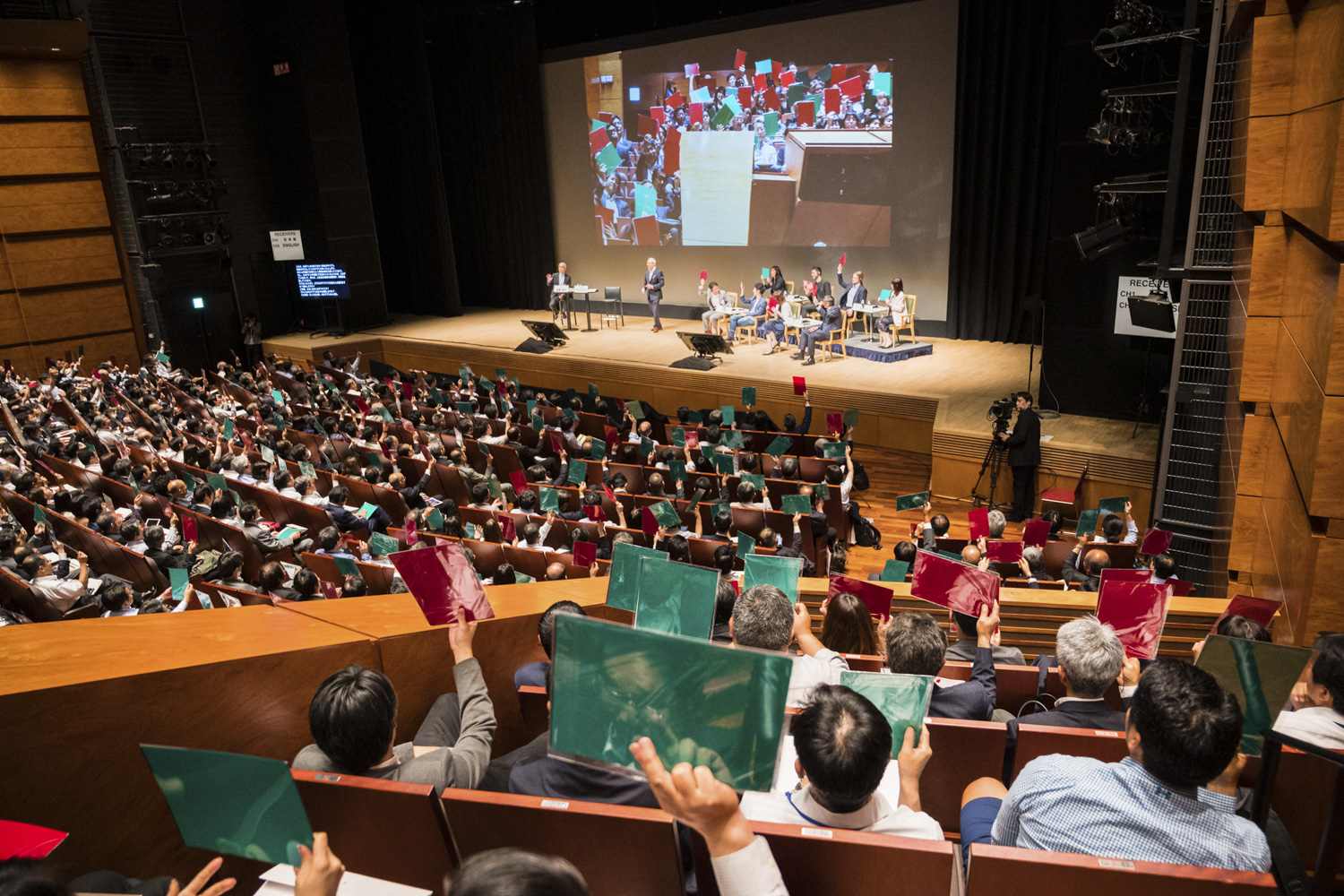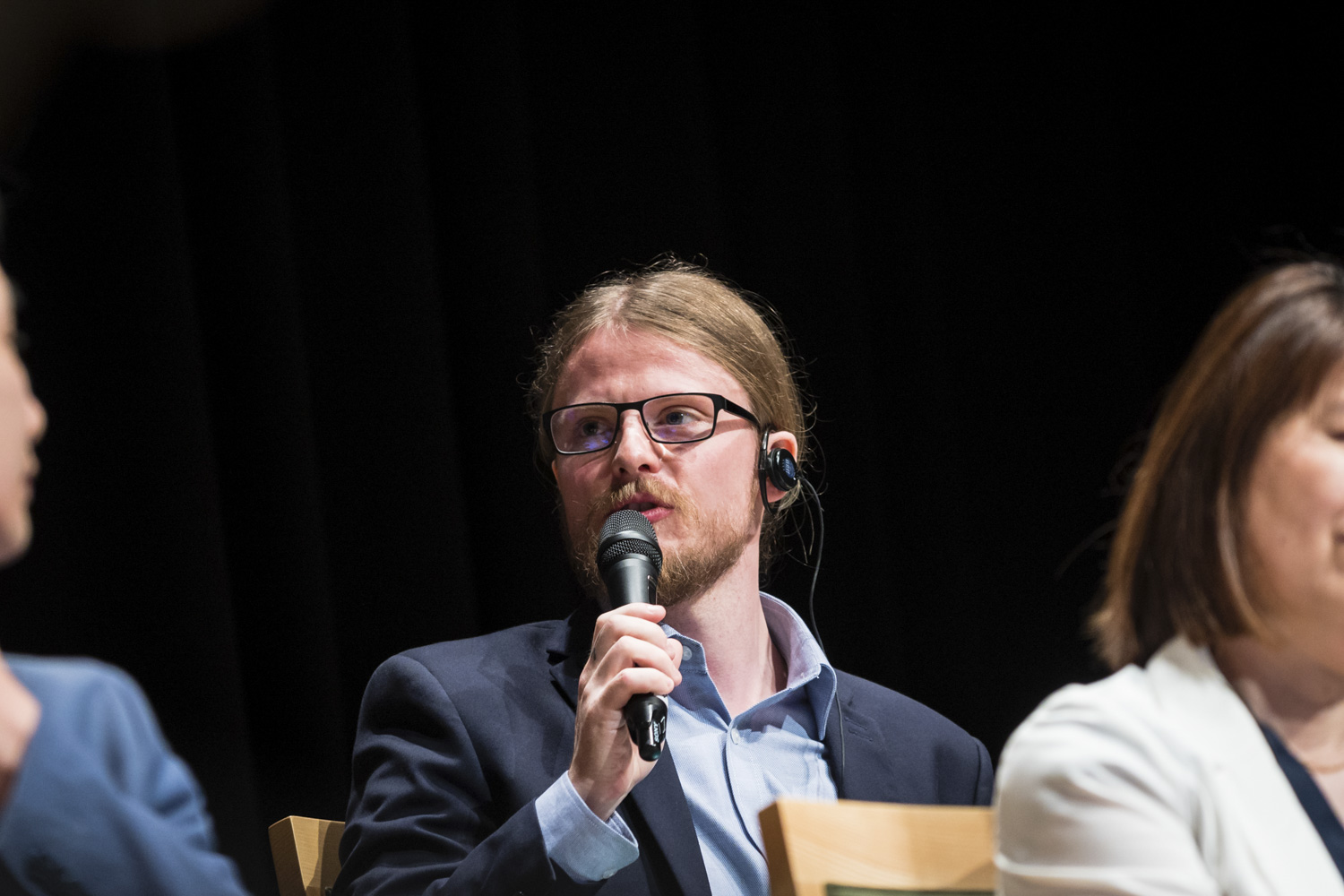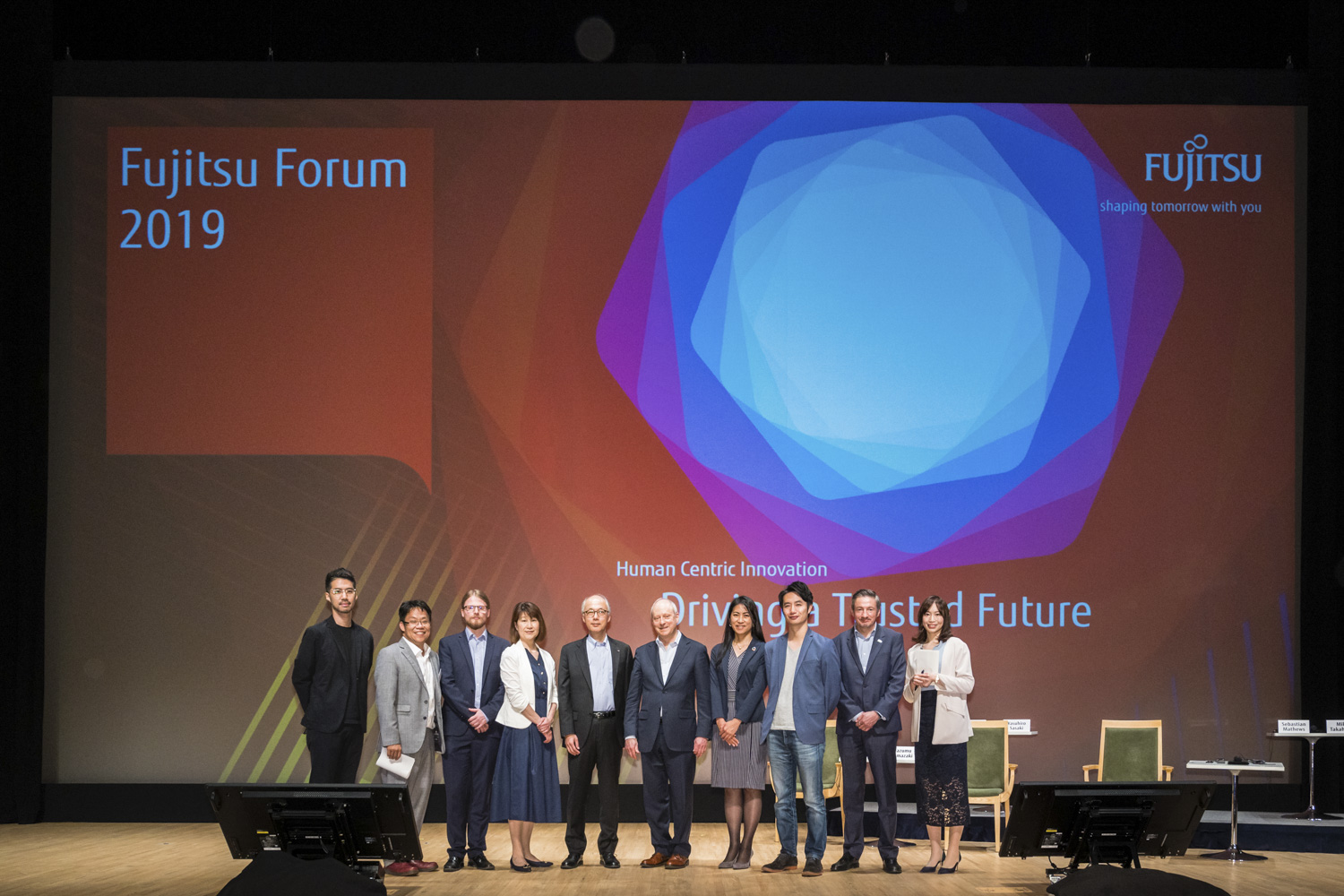
This post concludes our series on the panel disussion "How can we rebuild trust in the digital world?" at Fujitsu Forum Tokyo 2019. Catch up with Part 1 and Part 2.
Can virtual immortality ever be realized?
Michael Sandel
Edmund has made the bold claim that people are moving from a physical world into a virtual world, and we should, therefore, translate human experience and judgment in a way that takes the digital world into account.
The way we think, the way we feel, the reactions we have to people, to events, to our life circumstances, a lot of that are increasingly part of our digital existence. Now, suppose it was possible to aggregate every single email we send, every tweet we make, and every interaction, comment or opinion we express on social media. And that this aggregated data could be used to create digital avatars — digital twins — of people.
These digital twins would live on even after the person’s death, preserving their personality, the way they thought and felt, their preferences and opinions. If we can create these digital twins, they can effectively achieve a kind of virtual immortality.
After a person’s death, surviving friends and family would be able to converse with these digital twins. They would be able to ask them their opinions not just about past events, but even about things happening in the present.
Would you want to communicate with such a digital twin? Would you want to converse with the digital twin of your loved one? Or do you find the idea creepy such that you wouldn’t want to do that?
About one-third of the audience would like to have such a conversation, and two-thirds would not. On our panel, all but two say they would not. Sebastian, you answered that you would like to have such a conversation. Who would you like to talk to?
Sebastian Mathews
My ancestors. I would like to speak to the ones I have never met. But at the same time I would be afraid to see their consciousness be trapped inside a digital prison. I would feel sorry for them.

Michael Sandel
Mika, you wouldn’t want to have such a conversation...why not?
Mika Takahashi
It might be interesting to talk with an ancestor I’ve never met. But I think a key difference between the living and the dead is that the living are constantly changing. They live in an environment that changes from moment to moment, so their opinions and thinking are always in flux. But the digital twin remains completely unchanged from the point at which the person died.
Michael Sandel
Wait, I wonder if that is true. With machine learning, the digital twin could continue to learn and address new situations. So it would be possible that the digital twin could infer from the opinions they had on past affairs and react to a new situation in the family. If that were possible, would you want to speak to it?
Mika Takahashi
But there is a randomness to human behavior that enables people to suddenly start doing something different that cannot be predicted from their past behavior. So even if the digital twin learns from both past and present data, it cannot behave like a living person. It is not the same as the person who died, but something else.
Michael Sandel
Yumiko, what do you think? In most of the scenarios we’ve discussed today, you voted in favor of AI. Why did you vote against it this time?
Yumiko Kajiwara
I believe we have to accept death unflinchingly. It must be accepted as a fact. Only then we can move forward and think about what to do.
But when I talked with people working for a Japanese company, they said they wished they could ask their company founder how he would navigate the chaotic age we currently live in. If there were a digital twin of the founder, he might be able to advise them. I have heard similar ideas from people of other companies as well.
Although I want to accept the death of my own relatives as a fact, I am interested in the possibility of talking with the deceased leader in the context I just mentioned.
Michael Sandel
Hazumu, what about you?
Hazumu Yamazaki
Well, in Japan we have spirit mediums called itako who are said to be capable of communicating with the dead (laughter). But because digital twins would not actually be conscious beings, their responses in any conversation would be essentially automatic. I wouldn’t really be able to empathize with them, and would probably feel a sense of emptiness. To me, it’s more important to care for the living, so I personally wouldn’t be interested in talking to a digital twin. However, as for hearing the opinions of a long-deceased founder, I think it would be acceptable if it was made clear that those opinions were generated by an AI. Because in that case there would be no emotional investment, and no need to establish an empathic human relationship.
Michael Sandel
At the start of our discussion today, some people said that AI had no subjectivity or emotion, so its judgments are objective and fair, but later on, more and more people said that emotion, affection, and consciousness are important values for human beings.
Yoshi, we’ve talked extensively about AI, and we’ve discussed human love, life, and death. I think it’s time to wrap things up. What do you say?
Trust and corporate social responsibility
Yoshikuni Takashige
We had a lot of discussions today, and as we sought answers to seemingly simple questions, the discussions deepened in surprising ways. There were many different opinions expressed, and no simple solutions.
It is clear that the issues raised need to be discussed, not superficially, but openly and in great depth. I believe the most important thing is the ‘invisible value’ that we don’t usually notice. In order to discover it, we have to dive deep into our minds. That is what business leaders must address in this era of digital transformation.
In fact, through today’s discussions, we’ve come to realize there is a potential that even love and the thinking of a person can be digitized.
One thing I would like to ask Professor Sandel is: when collaboration between humans and AIs becomes commonplace, and AIs can make decisions about a wide range of things, what areas should humans keep as our most important and exclusive domains? What are the guiding principles?
Michael Sandel
Well, I think some of the guiding principles emerged from today’s discussions. One guiding principle is that for any use of digital technology to substitute for human judgement or supplement human judgement, whether we are talking about employee evaluations, medical diagnosis, or matchmaking, we need some sort of pattern or metric to guide the algorithms we employ.
And this raises a big philosophical question, because there are certain kinds of human judgement that cannot be measured by such patterns or metrics. Our panelists today mentioned about romance, emotions, affection, and respecting the boundary between life and death as examples.
But the boundary of practices which cannot be measured by patterns or metrics, and which necessarily involve human considerations, consciousness, affection or romance, is not really so clear. What about employee performance evaluations, for example?
There were differences of opinion on this subject in the audience and among our panelists. That is why this type of debate is so valuable.
I don’t think we should approach this as if we can find one principle that we can apply to all of these questions. Because all these debates are about very complex human issues — making a medical diagnosis, choosing a life partner, and communicating with a loved one. These debates will continue, and what matters is that we address these questions deliberately, and not expect that technology can decide them for us.
Yoshikuni Takashige
At Fujitsu, we have a human-centric philosophy that puts people at the center of everything. Every decision must be made according to this principle. Today’s discussions have reminded me that we need to expand and deepen this human-centric philosophy, so that it fully encompasses emotions and other invisible human values that we have to use for judgements.
Well, we’re running out of time, but before we close, I would like to ask a question that is particularly relevant to the business leaders here in our audience today. In these chaotic times, what kind of practical leadership is needed to ensure sound, ethically responsible decision-making?
Michael Sandel
First of all, I think business leaders need to engage with society and proactively debate the ethical questions, because they involve fundamental human values, not just numbers and metrics.
Secondly, I think it is important for business leaders to recognize that everyone including themselves is a citizen, and a human being with human reactions of his or her own as you have seen in voting.
Lastly, the discussion about AI and others may be seen as a question of technology. But actually, the more deeply we investigate these dilemmas of technology, the more we find that these are really debates about us, about what it means to be a human being.
Therefore, the challenge of new digital technology provides an opportunity for us to reflect more deeply what it is to be human.
Yoshikuni Takashige
Businesses involve corporate managers, employees, customers, consumers, and ecosystem partners, but they are all human beings and members of the same community. And if we can approach businesses from such a human-centric point of view, we will be able to make the right management decisions. Is that right?
Michael Sandel
I would say business in this digital age raises these big questions about technology. And it is not possible to take an ethical stand without engaging in these rather deep questions.
Yoshikuni Takashige
It comes down to a question of trust between people, and between people and companies. If we can establish a strong bond of trust among various stakeholders, that is a truly meaningful achievement.
Michael Sandel
Yes. But it is important to remember that building trust does not mean agreeing on everything. In fact, if anything, it is the opposite. It means you are willing to listen to opinions that disagree with your own — as the members of our panel did with one another — and respect those opinions and think them through. Trust for others and respect for disagreement with values are much more important than trying to get everybody to agree.
Yoshikuni Takashige
Thank you very much. One last question...can you tell us what role and responsibility you think a technology company like Fujitsu should play? What are your expectations for Fujitsu in this digital era?
Michael Sandel
My answer is very short. The biggest responsibility of a leading technology company in this digital age is to encourage and promote debate and discussion on big ethical questions, not just within the company, but also throughout society as a whole.
Yoshikuni Takashige
Professor Sandel, thank you very much.

As the interactive discussion about trust in the digital age drew to a close, the audience applauded the panelists and speakers for a fascinating conversation with many inspiring insights.
Catch up on Part 1 and Part 2 of this series.
Inspired to find out more about Fujitsu's vision to build a Trusted Future? Visit the Fujitsu Technology & Service Microsite to learn more.
And we'll be continuing the discussion at Fujitsu Forum Europe in Munich, November 6-7 2019 - click below for all the details.



